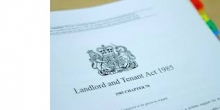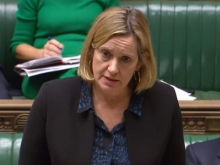Work TV
Watch our TV Channel dedicated to the ‘World of Work’. Explore our video library for informative videos featuring career opportunities at leading companies, franchising opportunities, further education and recruitment professions and their services.
Simon Collyer
Too Close to Call an Election Say Pollsters
The Brexit crisis has triggered a big move in public opinion, if the polls are to be believed. With a swing of about 1.5pc from Conservatives to Labour over November, Labour is now just ahead of the Conservatives in terms of the predicted popular vote. In the House of Commons, the two parties would be very close but the Conservatives would have a handful more seats.
If these figures came out exactly right, parliament would be badly hung with no credible combination of parties able to make a majority. The present Conservative/DUP arrangement would be well short of a majority, and a potential Conservative/SNP grouping, with a majority of 12 seats, would be literally incredible. But a Labour/SNP alliance would be two seats short of a majority.
Whatever Conservative divisions there are over the Brexit choices, don't expect to hear many of them calling for a snap general election at the moment.
The headline prediction table is here now:
|
Party |
2017 Votes |
2017 Seats |
Pred Votes |
Pred Seats |
|
CON |
43.5% |
318 |
39.0% |
288 |
|
LAB |
41.0% |
262 |
39.6% |
281 |
|
LIB |
7.6% |
12 |
8.2% |
16 |
|
UKIP |
1.9% |
0 |
3.6% |
0 |
|
Green |
1.7% |
1 |
2.3% |
1 |
|
SNP |
3.1% |
35 |
3.3% |
43 |
|
PlaidC |
0.5% |
4 |
0.5% |
3 |
|
Minor |
0.7% |
0 |
3.5% |
0 |
|
N.Ire |
18 |
18 |
Prediction based on opinion polls from 20 Oct 2018 to 27 Nov 2018, sampling 26,990 people.
If the new constituency boundaries were in place parliament would still be badly hung with the Conservatives short 20 seats of a majority with 281 seats out of 600, Labour on 248 seats, and the SNP winning 39 seats.
ABC Comment: have your say below:

Landlords Do You Have Tenants Under the Risk of Eviction?
The National Landlords Association have recently drawn our attention to these changes:
The DWP has announced landlord escalation routes for Universal Credit Live Service claimants at risk of eviction to go live on Monday 3 December.
1.1. Landlords with a tenant under an imminent threat of eviction should now call the National Universal Credit Live Service telephone line on 0800 328 9344 (this replaces 0345 600 0723). These calls will be escalated to the Housing Team who will make call the landlord to resolve the case. Landlords can continue to contact the Live Service Housing Team email inbox directly with any enquiries on
This email address is being protected from spambots. You need JavaScript enabled to view it..
2.2. The DWP claim the number of landlords calling the Live Service Landlord Escalation line to report a potential eviction has significantly reduced. Over time this line has received a large volume of inappropriate calls and so they have decided to close the line.
3.3. Landlords calling the existing Live Service Escalation Line will be directed to www.gov.uk/universalcredit to follow the correct escalation route. They will add a message prior to and following closure to signpost landlords to the new escalation routes.
4.4. There is no change to the Universal Credit Full Service process for landlords. In Universal Credit Full Service, landlords should initially engage with their tenant about the issue. The tenant has access to their own information via their online account, and can share the information with their landlord if they wish. The claimant can also ask through their journal, face to face or call the service centre and provide explicit consent to share their personal information with their landlord. If the landlord is unable to engage with their tenant, they can contact Universal Credit Full Service on 0800 328 5644 (this replaces 0345 600 4272).
Universal Credit Announcement: Landlord Escalation routes for live claimants
|
ABC Comment, have your say below:

Legal Challenge Against ‘Irrational’ Universal Credit Payment System
The High Court will hear a legal challenge tomorrow (Tuesday 27th & 28th November 2018) against the government’s Universal Credit payment system which has left some families worse off and coping with dramatically fluctuating income from month to month because of its rigid, inflexible assessment system.
Danielle Johnson, 25, from Keighley West Yorkshire, is a single mum who works part-time as a dinner lady and receives Universal Credit to top up her income. She is challenging the government via judicial review along with three other women in a similar situation.
Danielle is represented by Leigh Day and the other three women are represented by the Child Poverty Action Group (CPAG). Their cases are due to be heard together in the High Court at the Royal Courts of Justice building in London on the 27 and 28 November 2018. This is the second judicial review of Universal Credit following the High Court’s finding in June of last year that the system was unlawfully discriminating against severely disabled persons.
Danielle, like many employees, is paid on the last working day of the month. However, her monthly UC assessment periods are rigid – running from the last day of each month, meaning that if she is paid before the last day of the month, because payment falls on a weekend or non-banking day, she is assessed as having been paid twice that month, and not at all the next month. Claimants are unable to change their assessment period dates.
This has resulted in her receiving fluctuating UC payments throughout the year making it very hard to budget from one month to the next. It has also caused her to be around £500 worse off annually due to the fact that she is entitled to ‘work allowance’ as a parent. The work allowance is a disregard of £198 per month of a parent’s monthly earnings so in months where she is treated as having no earned income, she loses the whole benefit of the work allowance. In months where she is treated as having double income, she does not receive any extra work allowance.
As well as arguing that the UC payment system is irrational, and that the issues with varying pay dates could have been easily solved if properly considered, Danielle will also argue that the system is discriminatory because it disproportionately affects single parents, who are mainly female.
Danielle said:
“I have never been this financially unstable before, to the point of being unable to afford my rent and having to go into my overdraft when buying food. It is getting me into a vicious cycle of debt. Universal Credit is supposed to be simpler and fairer, but my experience of it is the opposite. I’m doing my best working part-time to make ends meet so that I can look after my daughter. I thought the government was supposed to help and support people like me trying to get back to work but I have found it to be the opposite.”
Tessa Gregory, partner at law firm Leigh Day, added:
“It is very clear through the multitude of problems reported that Universal Credit is a broken and ill-thought out system. Universal Credit is supposed to “make work pay”. It was purportedly designed to assist those in work being paid on a regular monthly basis, yet flaws in the system mean that our client, who has a regular monthly salary paid like many on the last working day of the month, is struggling to support her family. She has been left wondering why she ever went back to work, it is an absurd situation.
“Our client has repeatedly asked the government to address this problem, but they have refused to take action, so our client has been forced to take her case to court. It is important that this issue gets addressed as soon as possible as once Universal Credit rolls out fully the numbers affected will run into the tens of thousands if not more.”
Child Poverty Action Group’s solicitor Carla Clarke said:
“Universal credit is promoted as a benefit that incentivises work but in practice its rigid assessment period system undercuts that claim. Our clients have been left repeatedly without money for family essentials simply because of the date of their paydays. One of them, for example, did her utmost to find a workaround but ultimately had to decline a promotion in a job with good prospects when her then contract came to an end just to escape the trap. We say that the DWP’s refusal to alter our clients’ assessment period dates to avoid this problem discriminates against working parents - one of the two groups who are entitled to a work allowance - as well as being irrational and undermining one of the stated purposes of universal credit- to make sure that work always pays. This is a fundamental defect in universal credit and an injustice to hard-working parents and their children that must be put right for our clients and everyone else affected.”
Deal or No Deal?
We it has been done, the EU administration negotiating a deal that transposes into law something it’s deeply convinced is totally bonkers.
And something that UK citizens also sense is completely bonkers as well. A deal worse than the one we have already, and one that will not satisfy Brexiters either.
Interesting times ahead for Mrs May.
ABC Comment, have your say below:

MOD Fail to Pay Civilian Staff the Living Wage the SNP Reveal
Hundreds of civilian staff are being paid less than the real Living Wage by the Ministry of Defence, it has been revealed.
In figures revealed under Freedom of Information law, the MoD admitted that 223 civilian staff in Scotland were paid under £8.75 per hour – the real Living Wage at the time – at the beginning of November.
The real Living Wage – which has since risen to £9 an hour – is independently calculated to meet the cost of living.
The SNP has repeatedly called for powers over the minimum wage to be devolved to Scotland and for the minimum wage to be replaced by a real Living Wage
 .
.
81.6% of Scottish workers earn the Real Living Wage, the highest rate in the UK.
ABC Comment, have your say below:

Christmas Dates For Your Diary For Benefit Payments
We may be a month away from Christmas but here are some important dates for your diary.
Its not going to be much of a Christmas for many, but let us all hang-on and hope for better times.
Image left: Scrooge from a Christmas Carole.

Image: Christmas tree.
When will benefits be paid over Christmas and New Year?
- • Payments due on Monday, December 24, will be paid on Friday December 21
- • Payments due on Tuesday, December 25, will be paid on Friday December 21
- • Payments due on Wednesday, December 26, will be paid on Friday December 21
- • Payments due on Thursday, December 27, will be paid on Thursday, December 27
- • Payments due on Friday, December 28, will be paid on Friday, December 28
- • Payments due on Saturday, December 29, will be paid on Friday, December 28
- • Payments due on Sunday, December 30, will be paid on Friday, December 28
- • Payments due on Monday, December 31, will be paid on Monday, December 31
- • Payments due on Tuesday, January 1, will be paid on Monday, December 31
- • Payments due on Wednesday, January 2 (Scotland only) will be paid on Monday, December 31
When will Tax Credits be paid over Christmas and New Year?
- • Payments due on Tuesday, December 25, will be paid on Monday, December 24
- • Payments due on Wednesday, December 26, will be paid on Monday, December 24
- • Payments due on Thursday, December 27, will be paid on Monday, December 24
- • Payments due on Friday, December 28, will be paid on Thursday, December 27 (England, Scotland and Wales only)
- • Payments due on Tuesday, January 1, will be paid on Monday, December 31
- • Payments due on Wednesday, January 2, will be paid on Monday, December 31
When will Universal Credit be paid over Christmas and New Year?
- • Payments due on Tuesday, December 25, will be paid on Monday, December 24
- • Payments due on Wednesday, December 26, will be paid on Monday, December 24
- • Payments due on Thursday, December 27, will be paid on Thursday, December 27
- • Payments due on Friday, December 28, will be paid on Friday, December 28
- • Payments due on Saturday, December 29, will be paid on Friday, December 28
- • Payments due on Sunday, December 30, will be paid on Friday, December 28
- • Payments due on Monday, December 31, will be paid on Monday, December 31
- • Payments due on Tuesday, January 1, will be paid on Monday, December 31
- • Payments due on Wednesday, January 2, will be paid on Wednesday, January 2
MP's Push Back Vote On Universal Credit and Managed Migration
A group of MPs warn today in an urgent report calling on ministers to push back any vote on the flagship welfare reform.
The Commons Work and Pensions Committee claims that getting “managed migration” – the process of transferring claimants from existing benefits to universal credit – wrong when it starts in mid-2019 could “plunge claimants into poverty and even leave them destitute”.
Despite money being allocated for universal credit at the Budget, the DWP Select Committee warns that “major areas of concern” about the welfare reform remain.
The ABC have been highlighting fundamental flaws in the system, that have not been mentioned by the mainstream media.
As it stands says ABC founder Simon Collyer, ‘UC just could not work properly’ without a rethink. Forcing employees to upload wages data sooner could help, but companies want to run their businesses not see their mission as information gatherers for the DWP.
Esther McVey jumped ship at a very timely moment says the ABC. UC is a good idea in theory, but it is a complete ‘buggers muddle’ in practise.
If the DWP press on it will create a human catastrophe says the ABC.
ABC Comment, have your say below:

ABC Note: The Universal Credit Managed Migration report is below:
Number of NEETS Falls Slightly
For July to September 2018, there were 760,000 young people (aged 16 to 24 years) in the UK who were not in education, employment or training (NEET); this number decreased by 23,000 from April to June 2018 and was down 29,000 when compared with July to September 2017.
The percentage of all young people in the UK who were NEET was 10.9%; the proportion was down 0.3 percentage points from April to June 2018 and down 0.3 percentage points from July to September 2017.
Of all young people in the UK who were NEET, 37.0% were looking for work and available for work and therefore classified as unemployed; the remainder were either not looking for work and/or not available for work and therefore classified as economically inactive.
ABC Comment, have your say below:

ABC Warns of Growing Universal Credit Crisis in Essex
The Association of Pension & Benefits CIC is warning of a growing crisis in Essex that is being caused by Universal Credit (UC).
A spokesperson for the DWP Basildon processing center has today warned that staff - each managing around six hundred claimants, are not able to respond in writing in many cases to messages posted in customers on-line Universal Credit journals.
One of the reasons that complaints are piling up says the ABC, is something called the Assessment Period. What happens is when people sign-on is there is a week waiting period and then the assessment period starts. Universal Credit is assessed and paid in arrears, on a monthly basis in a single payment.
What is happening says the ABC, is that the DWP are not considering when you physically get paid - it is when the payment is recorded in the HMRC payroll software by the Company that creates an Employer Payment Summary (EPS). So, someone who gets paid on says the 28th of the month can find that a slow employer that updates the software on the 13th of the following month can move the payment into the next assessment period without the Claimant knowing.
Some Companies even do their books quarterly says Simon Collyer the founder of the ABC. So, someone expecting to get paid can suddenly find their Universal Credit can be stopped altogether.
Especially vulnerable are those with health issues. Simon Collyer has been battling the DWP to stop the arbitrary stopping of benefits for those with long-term health issues.
Universal Credit is nothing like the real world of work, says the ABC. When in employment, if it is payday, as an employee you know what you are going to get paid and when. The system is more like playing Russian Roulette.
The ABC has taken up this issue with Colchester MP Will Quince (Cons.) and they have asked if the Health and Safety Executive can become involved.
The ABC are asking that before anyone’s benefits are stopped for to cases to be referred to an independent medical expert for a risk assessment. There also ought to be a booklet explaining how Universal Credit works given to claimants say the ABC.
ABC Comment, have your say below

The Pope Speaks About Illegal and Inhumane Practices in The World's Fishing Sector
Illegal and inhumane practices in the world's fishing sector must be stamped out and replaced with sustainable ones to support the livelihoods of one of every 10 people on the planet, FAO and the Vatican said today.
"We convey a joint message urging an end to the violation of human rights within the fishing sector, and we call for an end to illegal, unreported and unregulated (IUU) fishing," FAO Director-General José Graziano da Silva said at an event celebrating World Fisheries Day.
Remedies, solutions and international legal instruments such as the FAO Port State Measures Agreement exist to safeguard a sector that offers a wealth of high-value opportunities yet too often hurts the most vulnerable, he added.
"Fish workers are crying out for help ... and we cannot shut our ears and we cannot remain silent," said Cardinal Peter Turkson, the prefect of the Vatican's Dicastery for the Promotion of Integral Human Development.
Noting frequent reports of forced labor, human trafficking and disappearance at sea, he added: "We see direct links between all these abuses and the use of flags of convenience, IUU fishing, and transnational crime."
The jointly-organized event was held to emphasize that labor rights are human rights and explore ways to coordinate the fight against trafficking and forced labor in the fishing sector.
"Fraudulent recruitment prctices, child labor, absence of written agreements, withholding of wages, blacklisting, violence, intimidation and other abusive working conditions" are rife in the sector and undermine the efforts of industry players who respect the rules, said Moussa Oumarou, Deputy Director-General of the International Labour Organization.
Protecting rights in the fishing sector
There are several broad fronts along which international efforts to combat labor abuses in the fisheries sector can be coordinated.
An important one is adoption and enforcement of the ILO's Convention 188 on Work In Fishing, which is designed to ensure that more than 38 million people working in the capture fisheries globally benefit from safety and health care, written work agreements, and social security protections. So far it has been ratified by 12 countries, with Namibia and Senegal joining this year.
Another important opportunity is presented by the FAO Port State Measures Agreement, which has entered into force and aims at stamping out IUU fishing, which accounts for substantial share of all fish caught at sea. It gives port authorities strong powers to inspect fishing vessels - often linked of cases of trafficking, labor abuses and slavery - and thus "allows more effective controls to ensure that the rights of crews are not violated," Graziano da Silva said, urging countries that have not yet signed the agreement to do so.
Cardinal Turkson stressed that " the number of governments that have ratified the international instruments is still very low" and urged internaitonal agencies to draft a "road map" for broader and faster adoption, saying that "if ratified and fully implemented by all States, they could dramatically change the life of fish workers, of their families, and the environmental status of fisheries resources."
The FAO Code of Conduct for Responsible Fisheries, agreed in 1995, has inspired a number of further supporting instruments and guidelines, including the includes the FAO Voluntary Guidelines on Small-Scale Fisheries, which have a great potential to strengthen human-rights for small-scale fishing communities.
FAO is also developing guidance on social responsibility in seafood value chains, which will be presented to the FAO Committee on Fisheries (COFI) in 2020.
"Through international collaboration and the implementation of international agreements, we can end all forms of modern-day slavery in the fisheries sector," Graziano da Silva said. "FAO looks forward to making this a reality."
Blue Hope
In an effort to transform Southern Mediterranean coastal zone communities into engines of stability and growth, FAO is also supporting the Blue Hope Initiative, which has been welcomed by Pope Francis. The initiative particularly aims to bolster small-scale fisheries challenged by climate change, poverty, migration trends, urbanization and other forces.
The new initiative was launched last month in pilot communities in Algeria, Tunisia and Turkey.
ABC Comment, have your say below:

























